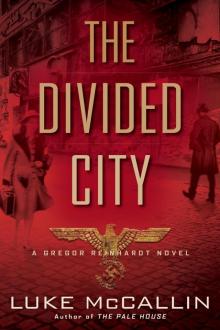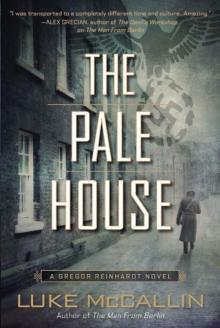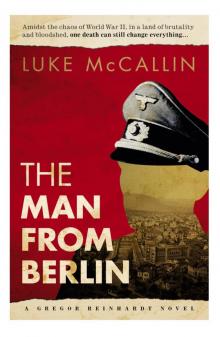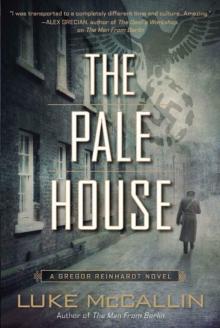- Home
- Luke McCallin
The Man from Berlin Page 10
The Man from Berlin Read online
Page 10
‘Sir,’ said Hueber, again. ‘He says that Vukić was a frequent guest here. She was usually here with guests, and their parties were always quite wild. A lot of drinking, and singing. He remembers her with Hendel because the times they were together were unlike any of her other visits. She came alone, and they talked alone. The barman says he thinks that Hendel was interested in her but she was not interested in him. He was…’ He broke off for a second, asked something in Serbo-Croat to which Dragan replied. Hueber nodded, and resumed. ‘He was not her type.’
‘What was her type?’ asked Reinhardt, guessing the answer.
‘Officers. Older ones. With gold on the shoulders,’ said Dragan, not needing Hueber to translate that one.
‘Anything else?’
‘Yes, sir,’ replied Hueber. ‘The barman remembers that while they were talking, others would come up to greet her. She was courteous, but she did not allow others to join them. Some of the men were annoyed with that. He knows because they came to the bar to complain. Afterwards, when she was finished talking with Hendel, she came to the bar, and she would laugh and joke with those men, and then everything was fine.
‘There was just one time when there was trouble. There was an officer who always tried to talk to Vukić. She did not like him. When she did not like someone, it was very clear, but this officer was persistent. The last time Dragan saw Vukić and Lieutenant Hendel together, this officer tried to join them. She told him to go away, and he was insulting to her, and apparently he tried to pull rank on the lieutenant. It did not work, and he came to the bar angry, talking with friends and asking what he did not have that a mere lieutenant did. He tried to cause trouble for Lieutenant Hendel, but his friends persuaded him out of it, and Vukić threatened to make his life a misery if he persisted in his attentions. This was on Thursday, last week.’
‘Yes,’ said Dragan. ‘Then Vukić, she go in back room with Hendel. To be private.’
‘Back room?’
‘Is private room. She go there sometimes.’
‘Does he know who the officer was?’
Hueber looked desperately uncomfortable. ‘Only that he is SS.’ At the mention of that, Dragan looked hard at Reinhardt, as if imparting to him how much this information could cost him.
‘No name?’
Hueber turned to look at Dragan, but the barman shook his head. ‘I don’t know name. But he is one of us.’
‘Not a German?’ Dragan shook his head again. ‘A Yugoslav? A Croat?’ Dragan paused, then shrugged, a movement that meant more yes than no but still managed to convey his discomfort. ‘What unit?’ asked Reinhardt, pointing to his collar and shoulder boards.
Dragan shrugged again, switching back to Serbo-Croat. It did not really matter, thought Reinhardt. There were not that many SS units around Sarajevo at the moment. That could be checked fairly easily.
‘Sorry, sir,’ said Hueber. ‘He does not know.’
‘He is not good guy, this SS.’ Dragan polished a glass hard, glancing up. ‘Pomalo. He crazy,’ he finished, tapping a finger on his head. ‘He take knife, stick it hard into the bar. Just there,’ he said, pointing at a scar of whiter wood in the bar’s surface.
‘A knife?’
‘Big knife,’ said Dragan, measuring out a distance with his hands. Reinhardt thought for a moment, digesting what he had learned. Hendel was a frequent guest, as was Vukić. According to everything he knew of the journalist, Hendel was not her type, however much he might have wanted to be. They met here several times, the last time two days before her murder. Someone, an SS officer, was sufficiently annoyed at her spending time with a lieutenant to get threatening about it. Not that there was no truth in any of it, but it all seemed a little obvious. ‘Was there anyone else here who knew Hendel? Who spent some time with him?’
Dragan had gone back to his glasses, another one vanishing into the folds of his cloth. ‘Are singers. With band,’ he said, motioning with his head over to the ensemble. ‘Florica and Anna.’
‘Tonight?’ asked Reinhardt, hearing himself slow down in his speech to match the barman. ‘Are they here, tonight?’
‘No,’ replied Dragan. He frowned as he put yet another glass away and leaned forward with both hands on the counter. ‘But why you asking these questions again?’
‘Again?’ He frowned and turned to Hueber. ‘What is he talking about? Has someone already been asking questions?’
As they talked, Reinhardt looked over his shoulder back into the club. From out of the gloom was a gleam of eyes from beneath shadowed brows, the crescents of faces over the angles of hunched shoulders. And here, there, faces looking back at him, like moons.
‘Sir,’ said Hueber. Reinhardt turned back, feeling more and more exposed down here at the bar. ‘Someone has already been asking questions about Lieutenant Hendel. From the description, it sounds like the Feldgendarmerie. He says we should talk to the two ladies he mentioned. Apparently the Feldgendarmerie roughed them up a bit.’ Reinhardt looked at Dragan as Hueber spoke. The barman’s eyes were fixed on the young corporal and swivelled to Reinhardt when Hueber had finished, then back to Hueber.
‘I policije. Don’t forget to say about police.’
Hueber gave a distracted nod. ‘Yes. Da. The Sarajevo police were also here. It was Padelin.’
‘Padelin was here?’ Reinhardt said it more as a statement. He looked at Dragan. ‘When?’
‘Was today. After lunch. They took Zoran. One of the waiters.’
‘Did they say why?’ Dragan shrugged, his eyes dull and flat. Reinhardt sighed, slowly. ‘Where are the girls now?’
‘At home,’ shrugged Dragan, again.
‘I want to see them. Do you have an address?’
‘You ask manager.’ He motioned over to the other side of the bar, where a small door stood almost unnoticed. Reinhardt walked back along the bar, past the Ustaša, who looked at him over his friend’s shoulder, and over to the door. Dragan pointed at a small brass handle, which Reinhardt pushed down on. A crack of dim light arrowed up the side of the door, widening as he pushed it open and stepped into a short corridor.
Like the bar itself, the corridor was red. Red wallpaper on the walls, red shades on the lights. Photographs hung on the walls, pictures of guests seated around tables, the photographer’s flash caught in wide liquid eyes and on the stems of glasses and the necks of bottles. Reinhardt paused in front of one of them. Vukić was seated in the centre, slightly side on to the camera. Her dress rode high and tight up her thighs, and she had one arm around the shoulders of a rather self-conscious-looking general. Again, Reinhardt found himself taken with the sheer animal attraction of her. He remembered that one dance with her, at Christmas, the giddy sensation she had left him with. He could only imagine the effect she must have had when she focused the searchlight blaze of herself on someone she was truly after.
There were three doors at the end, one in front of him and one to each side. The one in front was slightly ajar, and the sound of a wireless playing music came through softly. Reinhardt walked up to the door, knocked, and pushed it open, stepping into a small office. It was neatly kept, with a small wooden desk behind which sat a dark-haired man in a suit tapping a pencil against the top of the table, his head propped on his other hand. The man looked up from the papers he was going through as they came in, a slight frown of annoyance at the interruption swiftly replaced by a more neutral expression at the sight of a pair of German soldiers. The pencil went still in his hand.
‘Yes?’
‘You are the manager of this club?’
‘I am Robert Mavrić. Can I help you?’ he asked in heavily accented German.
‘I am conducting an investigation into the death of a German officer. This officer was a frequent guest here.’ The manager’s face narrowed, took on a pinched and haunted look, and he slumped back in his chair. ‘Two people who work for you wer
e friends with this officer. I need to question them, and so need their addresses.’
Mavrić’s eyes moved between the pair of them. ‘You know, I gave you this information yesterday morning.’
Reinhardt stared back at him, letting the silence grow. He hated to do it, but there were times when the uniform, and the weight of oppression implicit in it, were useful, like now. That, and the fact he was digesting what Mavrić had just said. Yesterday morning was Sunday. Vukić was not discovered until today, Monday morning. Mavrić tapped his pencil a few more times and then tore a piece of paper from a pad. He scribbled down an address and handed it to Reinhardt.
‘Where is it?’ Reinhardt asked.
Mavrić pursed his lips. ‘It’s in Terežija. Just over the Čobanija Bridge. Five minutes from here.’
Reinhardt turned to Hueber. ‘Go and give this to Claussen. Tell him we’re going straight there and that he knows how to find it.’ Hueber took the paper and turned smartly on his heel and left.
Mavrić tapped his pencil on the desk again. ‘Is there anything more I can do for you, sir?’
‘Did you know Lieutenant Hendel? The officer whose death I am investigating?’
Mavrić sighed, flipping the pencil onto the desk. ‘Like I told the others, I knew of him. He was a guest here. He behaved himself. He tipped well. He was well liked. He wasn’t any trouble.’
‘Whom did you tell?’
Mavrić frowned at him, a retort clearly on the tip of his tongue, but he bit it back. ‘I don’t know who they were.’
‘Describe them.’
The owner’s frown deepened. ‘I don’t know,’ he repeated. He cast his eyes around his little office. ‘One of them was a cop. One of ours. Tall, dark hair.’ He rummaged on his desk a moment, held up a card. ‘Padelin,’ he said, looking up at Reinhardt. ‘He was here earlier today. The other was one of your Feldgendarmerie. Reddish hair. Shorter than you. Glasses.’ He shook his head. ‘He came on Sunday. Really, nothing else.’
Reinhardt stared back at Mavrić a moment longer. The description sounded like Becker, but the important thing was the Feldgendarmerie were at least a day ahead of him, and Padelin had been and gone as well. He nodded. ‘The police. They took someone?’
‘Zoran Zigić. One of the waiters.’
‘They tell you why?’ Mavrić snorted and shook his head. Reinhardt could guess, but he would find out tomorrow. ‘Very well. Thank you for your time.’
Mavrić nodded, coming around the desk over to the door and opening it wider for Reinhardt. His evening suit was loose on him, the sleeves bunching over his wrists and ankles, as if it were made for someone taller. ‘My pleasure. I am sorry about Hendel, but you understand, I don’t want any trouble here. This is a good club.’
Reinhardt stepped out into the corridor and paused, looking at the two closed doors. He turned back to Mavrić. ‘Those are the private rooms?’ Mavrić nodded. ‘Show me the one Vukić used.’
Mavrić’s mouth tightened, but he pulled a small bunch of keys from his pocket and squeezed past Reinhardt to open the door to the right. There was a table, low, polished, surrounded by a curved sofa and other comfortable chairs, and there was a thick carpet on the floor. It was light, though, not because it was not red, but because of the long mirror that hung on the back wall to the right of the door, and the one that covered a large part of the ceiling. To the left, there was a window, and Reinhardt realised he was looking into the club from behind what he had thought was a mirror. It was a one-way glass. People could be in here, private, intimate, and yet look out there and observe the goings-on in the club. Reinhardt walked up to the window, looking at the backs of the band as they played. The sound of their music came through faintly. The room was well soundproofed.
Reinhardt turned around, seeing himself reflected in the mirror along the back wall, seeing the bar behind his reflection. ‘Vukić liked this room in particular?’ he asked, remembering the bedroom in Ilidža and the mirrors on the wall and ceiling there.
Mavrić looked startled. ‘Yes,’ he said, after a moment. ‘She was often a guest in here. She enjoyed her privacy. Whenever she was out there, she was always on show, she would say. In here, she could relax. Be herself.’
Reinhardt glanced around the room again, not having to try very hard to imagine what might have gone on in here. ‘Zoran,’ he said, the moment the thought occurred to him. ‘Zoran, the one the police took? He worked in here, didn’t he?’ Mavrić took a slow step into the room, looking blankly at him, and nodded. Reinhardt gave one last look around the room. ‘Thank you for your time,’ he said again, as he made for the door. It sounded so inane.
‘Yes, of course,’ replied Mavrić as he stepped backwards into the corridor to give Reinhardt space. His hand strayed out, hesitating. ‘Please, err… Captain,’ he said, glancing at Reinhardt’s collar tabs. ‘Please, I do not want any trouble. There will not be trouble for me? Because of this?’
Reinhardt looked at him a moment. Mavrić’s eyes blinked hard around a fixed stare. ‘I do not know,’ he said, turning away. He paused at the door back into the club and looked back. Mavrić looked haunted, a man in clothes too big for him. ‘I would worry more about Zoran,’ he said, pushing open the door.
The noise was louder. The band had left its little stage and was playing around one of the tables. It was filled with drunken Ustaše, who were getting stuck into a folk song. Glasses in their hands, they sang with gusto, their throats and faces straining at the words. Reinhardt ran his eyes around the club quickly, watching as heads turned his way, some staring, some turning away. From the bar, Dragan motioned him over with a twitch of his head. ‘That SS, the one I say of. He is here. He is asking about you.’
Reinhardt nodded his thanks. He turned and began making his way back through the tables, keeping his eyes fixed firmly on the maître d’ where he stood by his lectern in front of the frosted glass of the entrance. He was passing the last of the tables when a waiter glided in front of him, round silver tray held against his chest as if to shield him. The man inclined his head slightly and gestured with his free hand. Reinhardt frowned at him, faked a small smile, and shook his head as he made to move around the side of the waiter. The man took the smallest of steps to block him. ‘Sir. Please,’ he said. This time, he made his gesture into an invitation, his arm extended to point across the back of the club, into the far corner. ‘One of the guests would like to talk to you.’
Four men were sitting there. The light was dim, but Reinhardt could see that at least two of them were SS. There was nothing for it but to follow the waiter, who made to pull out a chair for him, but one of the officers hooked a boot around the chair leg and stopped him. The waiter froze, unsure of what to do, then backed away. Reinhardt did the only thing he could do and came to attention before them. In the quick glance he gave them, they were senior to him.
The officer who had hooked the chair was SS. His collar tabs bore the oak leaves of a Standartenführer – a colonel in the army – and his left cuff, where his arm rested on his table with his hand around a glass of beer, had a Prinz Eugen band. Seventh SS. Recruited mostly from the Volksdeutsche, Reinhardt remembered, the ethnic Germans. Sudetens. Hungarians. Yugoslavs. They were German, according to the Reich’s definition, but they were touchy about it. The man was long limbed, obviously very tall, with limp blond hair and eyes of a pale blue – so pale, they were hardly visible in the dim light. His cheeks, though, bore a high red flush, maybe from the heat, or alcohol.
‘Captain. What are you doing?’ The voice was languid, a slur discernible in it, and an accent, just as the barman had said.
‘Standartenführer,’ said Reinhardt. ‘I am on official business, conducting an investigation.’
‘Into what, exactly? You’ve got the whole place astir with your questions.’ The accent was Croatian, maybe Slovene, Reinhardt was sure of it.
‘The murder of a Ge
rman officer, sir.’
The officers glanced among themselves. The two SS grinned. The fourth man was an Ustaša, a squat lump of a man crammed into his black uniform like rubbish squeezed into a sack. ‘Is that all you’re doing, Captain?’ asked the Standartenführer, as he sipped from his beer glass. His right hand rested heavily on the butt of his pistol, thumb tucked tightly behind his belt, and his fingers tapped a rapid tattoo on the holster.
‘I’m not sure I follow,’ replied Reinhardt.
‘You’re asking about Marija Vukić, as well.’
‘Yes, sir. She was found dead with the officer. Therefore, she forms part of my inquiries as well.’
‘Right,’ said the officer, his glass held to his mouth and only his eyes visible over its rim. ‘And what have you learned?’
‘With all due respect, sir, I am not at liberty to divulge such details.’
The Standartenführer snorted, and the others around the table made various motions of amusement, like a ripple across a pond and him the source of it, like a rock tossed into water. ‘Sounds like a Jew, don’t you think?’ he asked his companions. ‘ “Not at liberty to…” ’ he repeated, with a little whine in his voice. He said something to the Ustaša and the man laughed, his cheeks quivering like slabs of suet. Reinhardt flushed under their gaze. The officer’s fingers tap-tapped on his holster, and he looked for a moment at Reinhardt’s Iron Cross, his eyes narrowing. ‘Are you Feldgendarmerie, Captain? You don’t look like a chain dog.’
‘Abwehr.’
The Standartenführer smiled, a wet gleam that slid rather naturally into a sneer. ‘Yes. Well, would you like to ask me anything, Captain? I knew Miss Vukić rather well, you know.’

 The Divided City
The Divided City The Pale House
The Pale House The Man from Berlin
The Man from Berlin The Pale House (A Gregor Reinhardt Novel)
The Pale House (A Gregor Reinhardt Novel)